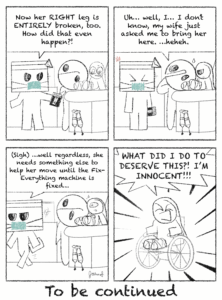There’s no reason for Jane Austen adaptations to be boring, other than a filmmakers’ conviction that there must be only one emotion, which is “1800s British.”
Many Jane Austen adaptations (including the 1996 Gwyneth Paltrow adaptation of “Emma,” arguably the most well-known variant apart from “Clueless”) seem allergic to change. They are more interested in conveying the feeling of the period than the emotions of the characters, leading to loyal but boring movies that can feel like a documentary.
What sets the 2020 adaptation of “Emma” (“Emma.” with a period at the end) apart from the others is the changes it allows itself. While “Emma.” is not an unfaithful adaptation, it does take calculated liberties.
The characters are given a new life as every actor finds something wonderful within their role. Special mention goes to Josh O’Connor as Mr. Elton, Emma’s unwanted suitor. Previous adaptations have portrayed Mr. Elton as a bore or conceited jerk, but O’Connor brings a self-absorbed, twisted glee. When he awkwardly proposes to Emma, his delivery makes clear how sure he is she’ll accept. This scene has a tough job, but O’Connor makes it at once threatening (the first indication to Emma that she’s not as good a judge of others as she thinks) and ridiculous: Mr. Elton is so enraged by Emma’s refusal that he stops the carriage they’re in and walks home in the snow, the protagonist of his own romantic tragedy about a lonely curate who never could find love.
But what undercuts the romances (happy and failed) is, of course, class tension. It’s why Emma implores Harriet to refuse the farmer’s proposal. It’s why Mr. Elton genuinely expects Emma to marry him. It’s why, when Emma humiliates the busybody Miss Bates on a picnic, she is shamed by Mr. Knightley: Miss Bates is poor, and Emma, using her wealth and luck, influences others’ opinions of Bates.
Mr. Knightley is always portrayed as the good guy who looks out for the working class. In the book and most adaptations, he always does the right thing when faced with a conflict between upper-class sensibilities and working-class needs.
Mr. Knightley’s behavior, as well as the behavior of the rest of the cast, is unchanged in this adaptation. It is, however silently put into context.
Mr. Knightly first appears being dressed by his servants. They help him put on his collar and coat, and then he leaves his sizable estate, walking on foot to see Emma’s father. As he leaves, he wittily remarks on his owning a carriage, but never using it. His free-spiritedness and empathy for the working-class is palpable, but so is his disregard for his servants.
The appearance of servants in places where they naturally would be, but are never mentioned in the book, recurs consistently, especially (and I think deliberately) in scenes with Mr. Knightley. When Mr. Knightley and Emma finally kiss, the last shot is of two servants turning, embarrassed and beneath the notice of the two leads celebrating Emma’s newfound empathy for those less wealthy than her.
Both the book and the adaptation open by announcing to the reader that Emma “had lived nearly twenty-one years in the world with very little to distress or vex her.” This movie trudges through the ugly parts of Emma’s life to find anything it can to vex her. Without revealing too much, the ending is significantly changed to place a greater burden of responsibility on her, making it one of the best scenes in an already fantastic movie. It also tells everyone watching that despite Emma’s newfound class-consciousness and Mr. Knightley’s snarky above-it-all attitude, they both still have a blind spot in who they consider to be truly “people.”
In a field of unyieldingly loyal adaptations, “Emma.” doesn’t see the 1800s with the kindly lens left to us by its most famous minds — instead, it shows us the truth.


